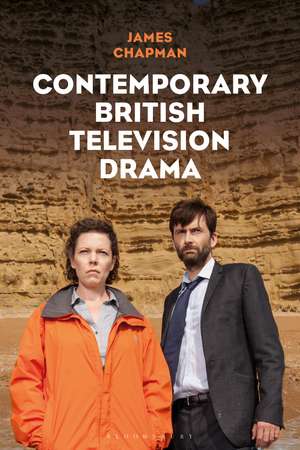Contemporary British Television Drama
Autor Prof James Chapmanen Limba Engleză Paperback – 27 mai 2020
| Toate formatele și edițiile | Preț | Express |
|---|---|---|
| Paperback (1) | 171.85 lei 3-5 săpt. | +41.84 lei 7-13 zile |
| Bloomsbury Publishing – 27 mai 2020 | 171.85 lei 3-5 săpt. | +41.84 lei 7-13 zile |
| Hardback (1) | 509.52 lei 6-8 săpt. | |
| Bloomsbury Publishing – 27 mai 2020 | 509.52 lei 6-8 săpt. |
Preț: 171.85 lei
Preț vechi: 199.71 lei
-14% Nou
32.88€ • 34.33$ • 27.22£
Carte disponibilă
Livrare economică 15-29 martie
Livrare express 01-07 martie pentru 51.83 lei
Specificații
ISBN-10: 1780765231
Pagini: 200
Dimensiuni: 156 x 234 x 10 mm
Greutate: 0.32 kg
Editura: Bloomsbury Publishing
Colecția Bloomsbury Academic
Locul publicării:London, United Kingdom
Caracteristici
Notă biografică
James Chapman is Professor of Film Studies at the University of Leicester, UK, and editor of the Historical Journal of Film, Radio and Television. His previous books on British popular television are Swashbucklers: The Costume Adventure series (2015), Inside the Tardis: The Worlds of 'Doctor Who' - A Cultural History (2nd edn 2013) and Saints and Avengers: British Adventure Series of the 1960s (2002).
Cuprins
AcknowledgementsIntroduction1. Spooks2. Foyle's War3. Hustle4. Life on Mars5. Ashes to Ashes6. Downton Abbey7. Sherlock8. BroadchurchNotesBibliographyIndex
Recenzii
Is British television drama struggling in the face of today's US-dominated streaming and box-set culture, or actually in reinvigorated rude health? That is the question explored in James Chapman's new volume which offers a series of well-researched case studies of eight of the most memorable British productions of the last twenty years in order to wave the flag for the continuing quality and relevance of UK-produced TV drama. Author of previous historical studies of the TV action-adventure series and Doctor Who, Chapman finds cause for optimism when he turns his attention to contemporary British TV drama of the last 20 years: from Spooks and Hustle to Sherlock and Broadchurch?. Clear and accessible, this volume will appeal to students and scholars alike as well as to the general reader curious to find out more about how British TV drama has reinvented itself in the twenty first century.
In this highly readable study of some of the most remarkable British TV dramas of recent years, Chapman shows how they make the most of new circumstances of production, new modes of storytelling, and engage with current social and political concerns. He shows how the best UK dramas of our time have not only been innovative but also build on past TV successes to give foundation to our new TV "golden age".
'This is a wonderful piece of scholarship and timely in that it corrects the assumption that high quality television is purely the achievement of US television drama. James Chapman uses his considerable skills as one of the finest scholars of popular film and television in order to carefully and keenly explore the significance and value of some of the best British dramas of the past two decades. His lively prose effortlessly details their production and critical contexts while marshalling his not inconsiderable insights in order to give us a compelling and important book.'
Descriere
The early twenty-first century has seen the emergence of a new style of television drama in Britain that adopts the professional practices and production values of high-end American television while remaining emphatically 'British' in content and outlook. This book analyses eight of these dramas - Spooks, Foyle's War, Hustle, Life on Mars, Ashes to Ashes, Downton Abbey, Sherlock and Broadchurch - which have all proved popular with audiences and in their different ways represent the thematic and formal paradigms of post-millennial drama.James Chapman locates new British drama in its institutional and economic contexts, considers their critical and popular reception, and analyses their social politics in relation to their representations of class, gender and nationhood. He demonstrates how contemporary drama has mobilised both new and residual elements in re-configuring genres such as the spy series, cop show and costume drama for the cultural tastes of modern audiences. And it concludes that television drama has played an integral role in both the economic and the cultural export of 'Britishness'.
